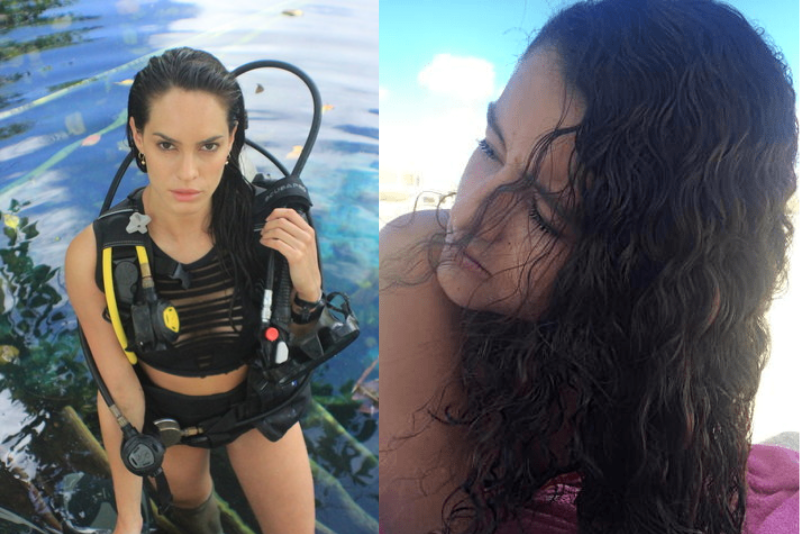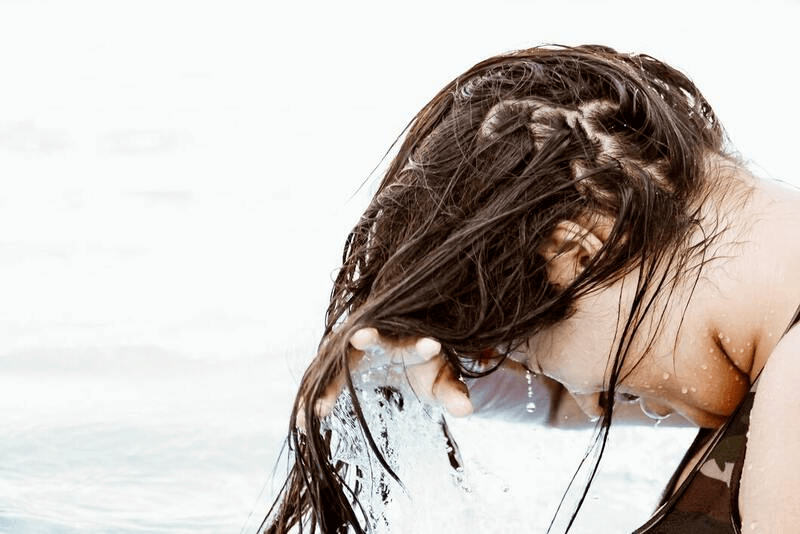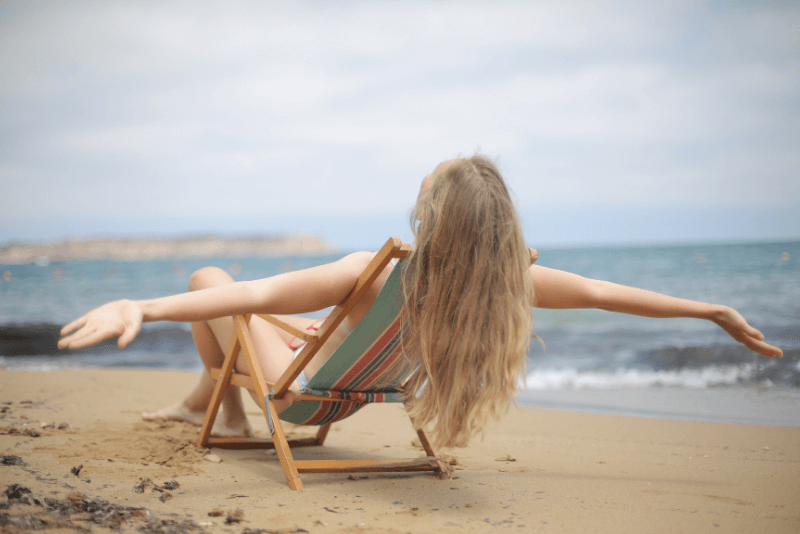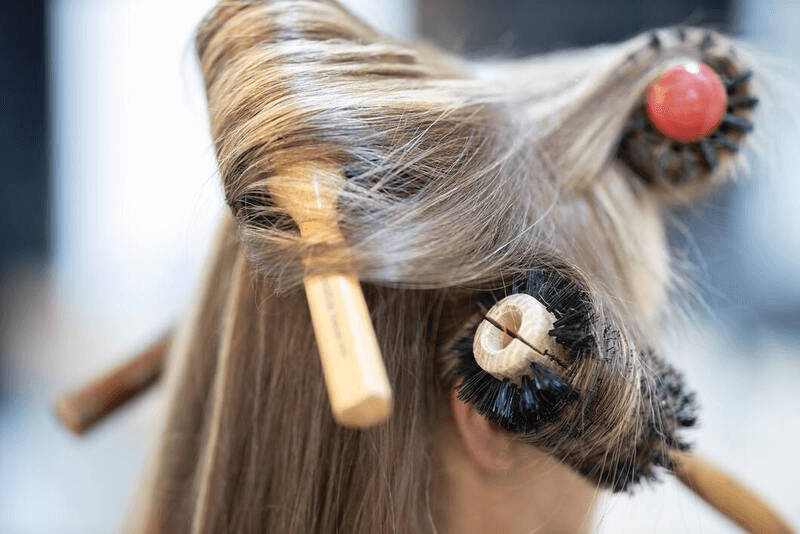We all love spending a day at the seaside, scuba diving, snorkeling, or just relaxing hair underwater, except for one problem: hair. Saltwater together with the sun can in fact dehydrate your hair, lead to breakage and split ends and damage it, mostly scuba diving women’s hair. Fortunately, our scuba instructor and marine biologist Olimpia has listed several ways to take care of and preserve the beauty of your hair. If you do scuba diving often and want to avoid damage, you may want to reinvigorate your hair and treat it best.
So, here are some useful tips on how to protect hair from salt water naturally, treat your hair before, during, and after a day of diving, or at the beach.

Is ocean water good for your hair?
Saltwater contains vitamins and minerals that are beneficial for your hair, a quick dip in the ocean will nourish your scalp and help your hair grow, but if we spend all day with salt on our hair, it will get dehydrated, in short, overexposure is not good. That’s why we need to know how to protect hair from salt water.
Prepare your hair correctly
SCUBA diving hair protection starts before entering the ocean, make sure your hair is tangle-free and if possible, soaked in fresh water. Pre-soaking it in freshwater is a great way to keep your hair from absorbing too much salt, preventing dehydration. The best way to avoid nasty tangles is to put your hair up in a ponytail or in braids and secure it using a headband or a buff. These tools are great because they will also keep your long hair underwater away from your face during the dive. Here you will know how to wear long hair while scuba diving.

Find the best hairstyle for you
Try different ways to secure your hair and find the best one for your type of hair. Braids can be a great way to keep it secure for people with coarse hair. If you have fine hair, braids can worsen tangles. For fine hair, a great way to tie it is to put it up on in a twisted or rope ponytail(avoid the loose ponytail!) and place hair ties along with the ponytail. Make sure to secure the top of your head with a headband or buff to prevent flyways from getting in your field of vision, especially with curly hair underwater which tends to frizz.
Get the right accessories
A neoprene mask strap can go a very long way in preventing breakage. Make sure to get a full neoprene and nylon strap instead of just a strap cover to prevent damage at the sides as well. SCUBA head covering materials and type of hair ties are also important. A personal favorite is silicone ties, these don´t slip while diving and are easy to remove with wet hair. Another popular option is spiral hair ties, these don´t slip as much as nylon-covered ties and they reduce breakage. Make sure to try different options to find the right one for your tresses.

Use natural oils
Coconut oil is an excellent moisturizing agent for your hair, before and after a day at the beach. Coconut oil gives the hair immediate silkiness and shine, helping to detangle it, make split ends less visible, and in general, make it appear healthier. Plus, if you apply it before entering the water, it helps seal your hair cuticles and protect them from damage. An added bonus of coconut oil is its natural SPF factor of 4, so it will also help prevent sun damage. Other natural oils that lessen follicular dehydration are olive, argan, and jojoba oils. Try them out to discover your favorite!
Pro tip: make sure you use virgin or unrefined oils for full benefits!

Always rinse your hair
Salt is good for certain conditions but with exceptions. Saltpeter is very common to get when you are near the ocean, that’s why divers rinse after diving, gear, wetsuit, mask, it is mandatory. Always rinse your hair as soon as possible after being in salt or chlorine water. Removing the salt dramatically reduces dehydration, especially if you combine salt or chemicals with sun exposure. Rinsing your hair with fresh water is a MUST for hair care. This is also a good moment to apply conditioner and detangle it if you are finished with your activities. Remember not to apply any products if entering the ocean again, unless they are reef-safe leave-in conditioners.

Use shampoos for dry, brittle hair
Consider using specific shampoos for dry hair for your relaxing shower once back from the sea. After a day of salt water and sun, your hair needs to be thoroughly washed to remove all traces of salt or sand, but at the same time, it needs nourishment to plump up and stay soft and shiny. The best options are the ones without any silicones, sulfates, or parabens, as these will remove the salt without removing too many natural oils.

Try using a moisturizing mask or leave-in conditioner
Treat yourself to a moisturizing hair mask, besides it being like a stay-at-home spa, they have the advantage of nourishing hair follicles more thoroughly than regular conditioners. If you want to go straight to bed or you are going out, leave-in conditioners are also great, after a long day of scuba diving, snorkeling, or sunbathing.
Give your hair a break
Both before and after a day at the beach, it is important to give your hair a break. Try not to stress your hair further with a straightener or hairdryer after a day at the beach.
If you can, wash it only with water or dilute the shampoo with water, especially if you are going to the beach again. Thanks to this, you will avoid over-stressing your hair and, above all, eliminate the natural oils that hair follicles need to stay hydrated. After finishing your activity, brush your hair with a wide-toothed brush or comb to prevent breakage.
Moreover, the mask that you use when scuba diving or snorkeling creates friction on the hair and can damage it. After finishing your activity, brush your hair with a wide-toothed brush or comb to prevent breakage.

Treating your hair after a day at the beach is not optional by any means. In fact, especially if you subject them to salt water, air and sun constantly, they will tend to dry out, wear out, and could alter in color. Make sure you rinse it before entering the ocean again or use reef-safe options!
By taking advantage of the advice provided and adopting the appropriate tools and practices, following these summer hair care tips to keep the health of your hair will always be guaranteed and you will be able to enjoy your activities without stress!




